 Petzlover
Petzlover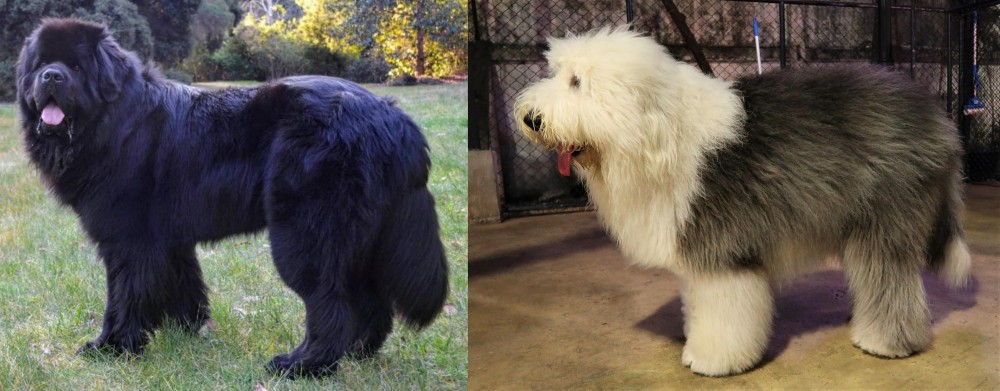 Newfoundland Dog is originated from Canada but Old English Sheepdog is originated from United Kingdom. Newfoundland Dog may grow 14 cm / 6 inches higher than Old English Sheepdog. Newfoundland Dog may weigh 35 kg / 78 pounds more than Old English Sheepdog. Both Newfoundland Dog and Old English Sheepdog has almost same life span. Both Newfoundland Dog and Old English Sheepdog has almost same litter size. Both Newfoundland Dog and Old English Sheepdog requires Moderate Maintenance.
Newfoundland Dog is originated from Canada but Old English Sheepdog is originated from United Kingdom. Newfoundland Dog may grow 14 cm / 6 inches higher than Old English Sheepdog. Newfoundland Dog may weigh 35 kg / 78 pounds more than Old English Sheepdog. Both Newfoundland Dog and Old English Sheepdog has almost same life span. Both Newfoundland Dog and Old English Sheepdog has almost same litter size. Both Newfoundland Dog and Old English Sheepdog requires Moderate Maintenance.
 The Newfoundland dog is a large working dog. They were bred and used as a working dog for fishermen in the Dominion of Newfoundland, an eastern province of Canada. With their web feet they were also used for water rescue.
The Newfoundland dog is a large working dog. They were bred and used as a working dog for fishermen in the Dominion of Newfoundland, an eastern province of Canada. With their web feet they were also used for water rescue.
The history of the Newfoundland Dog is unsure, but the breed as we know it today originated from dogs which were brought from Newfoundland to England in the early 1800's.
The Newfoundland Club was founded in 1886 so as to promote the breed.
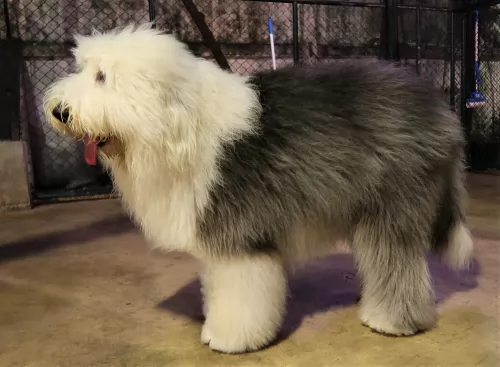 The origin of the Old English Sheepdog is unclear as records weren’t kept. However there are some aspects that suggest the dog originated in the 19th century and that the Scottish Bearded Collie had a significant part in the development of this dog which hails from England.
The origin of the Old English Sheepdog is unclear as records weren’t kept. However there are some aspects that suggest the dog originated in the 19th century and that the Scottish Bearded Collie had a significant part in the development of this dog which hails from England.
It is also believed that the Russian Owtchar was involved in the development of the Old English Sheepdog. The dog was recognized by the American Kennel Club in 1888. In 1904, the Old English Sheepdog Club of America was also founded.
The shape of the dog has changed very little over the years and it was in the 1880s that the dog was exported to the United States.
 The Newfoundland is a large dog standing at between 63cm to 74cm, both male and female. Weight can vary from 45kg to 80kg.
The Newfoundland is a large dog standing at between 63cm to 74cm, both male and female. Weight can vary from 45kg to 80kg.
He has a double coat of medium-length straight hair and the hair can be black, brown or gray. Although it is common for the Newfoundland to have a solid-colored coats, you will sometimes find small patches of white on their chest, toes, or at the tip of the tail. Then again you get the less common Newfoundlands where the coat is white with some black markings and these are known as Landseers.
The outer coat is coarse, oily and water-resistant quality, suited to a dog that loves to spend time in the water. The head is broad and large with small ears that he keeps lying close to his head. The tail is long and plumed and the feet are wide with webbing between the toes which aids him with swimming.
As with many large dogs, the Newfoundland is docile and his sheer size makes it that he is best suited to life in the countryside as opposed to living in the city. This is also because this particular dog wants to be close to water where he can swim.
He is a trustworthy, loyal dog and will get on well with children and pets in the home. Training and socialization is always recommended for any dog, but a big dog can often ‘get in the way’ indoors and you want him to lie down or sit when you tell him to. He is an intelligent dog so will respond well to training.
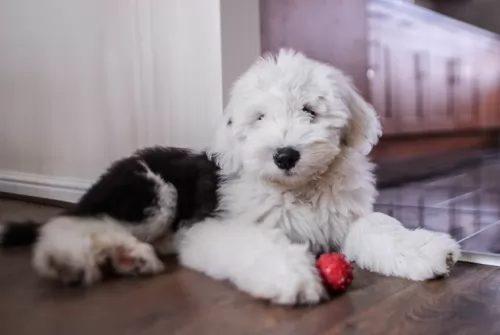 The Old English Sheepdog is a large dog standing at between 50 and 60cm and weighing between 27 and 45kg.
The Old English Sheepdog is a large dog standing at between 50 and 60cm and weighing between 27 and 45kg.
He is muscular with a broad bottom and hip area. The head is also large and the small ears are carried flat. The tail has always been docked, giving the dog a large panda-bear look to him, but these days the tail is often left long, and the dog loses that square compact look.
When the tail is left long it is well feathered. The coat can become fairly long and is quite harsh and wavy to straight. The coat is essentially grey with white hair over the head area. The puppies are born with their hair being black and white, and later on the traditional grey coloring comes in.
What is quite interesting with this dog is that it stands lower at the shoulder than at the loins, so just like a Panda bear, he also lopes or walks in a bear-like fashion.
The Old English Sheepdog isn’t an aggressive dog. He is social, intelligent and entertaining for his human family, whom he loves to spend time with.
He is an energetic dog too and he would prefer a country setting where there are large fields to run in as opposed to living on a tiny property in the city. He is an adaptable dog though, and will slot into life in the city or suburbs, so long as he is well exercised.
Train him and socialize him and he will become an obedient, amicable pet to have around.
 Your beautiful, cuddly puppy will soon become a giant dog with a big appetite. Don’t just buy a cute puppy if you can’t afford to feed him properly and you can’t give him lots of attention.
Your beautiful, cuddly puppy will soon become a giant dog with a big appetite. Don’t just buy a cute puppy if you can’t afford to feed him properly and you can’t give him lots of attention.
Your dog will also be shedding, so be aware of these aspects before you bring a large Newfoundland into your home. He is a gentle dog, but his size could be worrisome if he isn’t trained, socialized and supervised.
Newfoundlands are amicable dogs, and while he may like to spend times indoors with you relaxing, he is a working dog and will require exercise and activities for mind and body.
Give this giant of a dog a loving home, and you will have a special, devoted friend like no other.
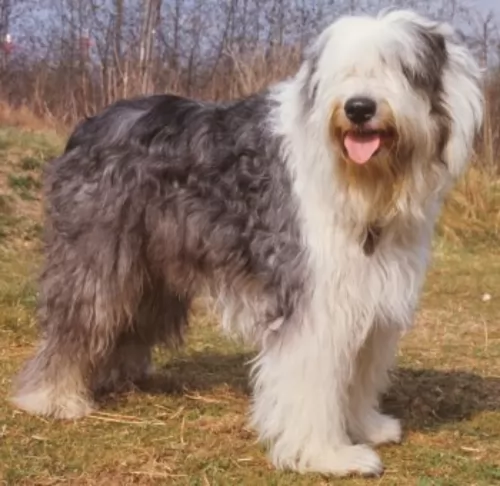 The Old English Sheepdog is the ideal dog for a family pet. They love spending time with their human family and are affectionate and loyal, getting on well with children as well as other pets.
The Old English Sheepdog is the ideal dog for a family pet. They love spending time with their human family and are affectionate and loyal, getting on well with children as well as other pets.
From the time he is a puppy, you can see that he is fun-loving and easy going while also being intelligent. He is also a guardian and wants to protect his human family.
Provide him with the opportunity to get out into the country sometimes if you don’t live on a farm because he is essentially a farm dog. He used to be a herding dog and likes to be busy. Treat him well and have him trained and socialized and he’ll make you a superb pet.
 The Newfoundland can be prone to serious health conditions such as hip dysplasia and gastric torsion. Deep chested dog breeds like the New Foundland are susceptible to bloat, a life threatening condition where the stomach swells, it can twist and the dog can die if help isn’t available. He will be salivating, restless and whining while also trying to vomit.
The Newfoundland can be prone to serious health conditions such as hip dysplasia and gastric torsion. Deep chested dog breeds like the New Foundland are susceptible to bloat, a life threatening condition where the stomach swells, it can twist and the dog can die if help isn’t available. He will be salivating, restless and whining while also trying to vomit.
Giant breeds are also prone to elbow and hip dysplasia, a genetic problem which can ultimately affect your dog’s mobility.
When in any doubt about your pet’s health, get him to the vet.
 It is estimated that the beautiful Old English Sheepdog can live to be about 10, 11 or 12 years of age if he is looked after well. Just like with other dog breeds though, this particular dog is also prone to some of the common dog diseases there are.
It is estimated that the beautiful Old English Sheepdog can live to be about 10, 11 or 12 years of age if he is looked after well. Just like with other dog breeds though, this particular dog is also prone to some of the common dog diseases there are.
Some of these diseases include hip dysplasia, diabetes, eye diseases and deafness along with some skin problems.
As a chronic disease, Diabetes can affect dogs as well as other animals and humans. Diabetes in dogs can’t be cured but it can be managed, with Diabetes Mellitus being the kind of diabetes most seen in dogs. Whatever kind of diabetes your pet has, the negative effects remain the same.
It can be devastating when your dog has been with you for about 10 years, to discover that he has cancer. Of course, cancer is the leading cause of death found in dogs older than the age of 10.
Many cancers are curable if you catch them early. Malignant lymphoma is a common cancer with dogs but there are other cancers too. The warning signs of cancer in dogs are much the same as what you get with humans. You’ll discover a lump or even an injury that won’t heal. There could also be abnormal bleeding.
There are many different kinds of skin problems seen in dogs, some of which are more common than others. You’ll notice your dog licking a part of the body so that the hair disappears and the skin becomes exposed.
There are skin problems started because of inadequate diet and lack of nutrition. There are plenty of commercially manufactured pet foods that don’t have the right amount of vitamins and minerals your pet needs. Always buy a good quality one to fight these very aggravating skin allergies. A vet may give hydrocortisone products but many dog owners these days try to treat their dogs with natural products.
 Your dog’s coat will need to be brushed at least twice a week as he is a heavy shedder.
Your dog’s coat will need to be brushed at least twice a week as he is a heavy shedder.
Do the nails of your dog as soon as they start getting long. Long nails can hook on things and cause injury to the dog’s paw area.
This is a dog with floppy ears so check inside the ears to prevent ear infections, more so because this is a water-loving dog. The dampness inside the ears can cause bacteria.
This is a giant breed and sadly, they have the shortest lifespans. You want to make sure that you keep your giant breed as healthy as possible to ensure he reaches the 10 or so years allotted to him and to also prevent health problems.
Make sure your giant breed puppy and adult has the very highest quality commercially manufactured food to ensure he gets the right balance of nutrients in. This food also makes sure that your puppy rather grows at a slower rate and stronger as opposed to growing too quickly. Rapid growth comes with joint problems.
All dogs, large and small, don’t want exotic, strange food that upsets their stomachs. They want consistency and simplicity and they want tasty food. Give him some homemade food such as cooked chicken, brown rice or pasta and some vegetables such as sweet potato, carrots and spinach. You can add this occasionally to his dry kibble.
Add in some raw meat from time to time too. Your pet will be strong, healthy, happy and content.
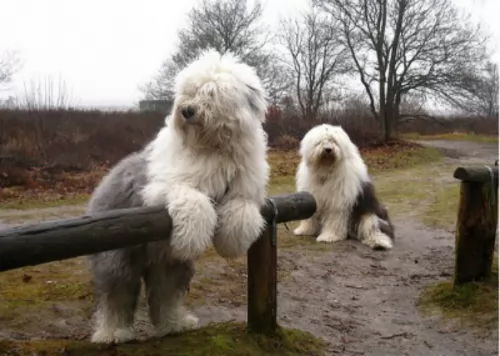 Food allergies are caused by your dog eating food with ‘bad’ ingredients which don’t agree with him. Make sure your pet has a wholesome diet.
Food allergies are caused by your dog eating food with ‘bad’ ingredients which don’t agree with him. Make sure your pet has a wholesome diet.
Invest in the very best quality commercially manufactured food. Home-made food is always a wonderful treat for any dog but it needs to be kept simple. No exotic, spicy foods and no suddenly changing your pet’s diet.
Simple, nutritional boiled chicken, brown rice or pasta and vegetables such as sweet potato, carrots and spinach added into his kibble as a treat will do wonders for your pet and he will thank you for keeping his meals tasty and simple. A little bit of raw meat added in occasionally can also do him the world of good. Fresh, cool water must always be available.
The Old English Sheepdog is quite a high maintenance dog, what with that long hair and all, and some owners of this dog prefer to take him to the parlor to have the hair sheared and wash, otherwise it could become a mammoth task for a dog owner.
If you opt to keep the hair long, you may end up having to be constantly brushing your pet’s coat to prevent it tangling. Not only that, if you live in a hot area, cutting the hair can help towards keeping the dog cool.
The ears of your dog should be checked regularly for infection as well as the eyes, and keep the nails clipped as well.